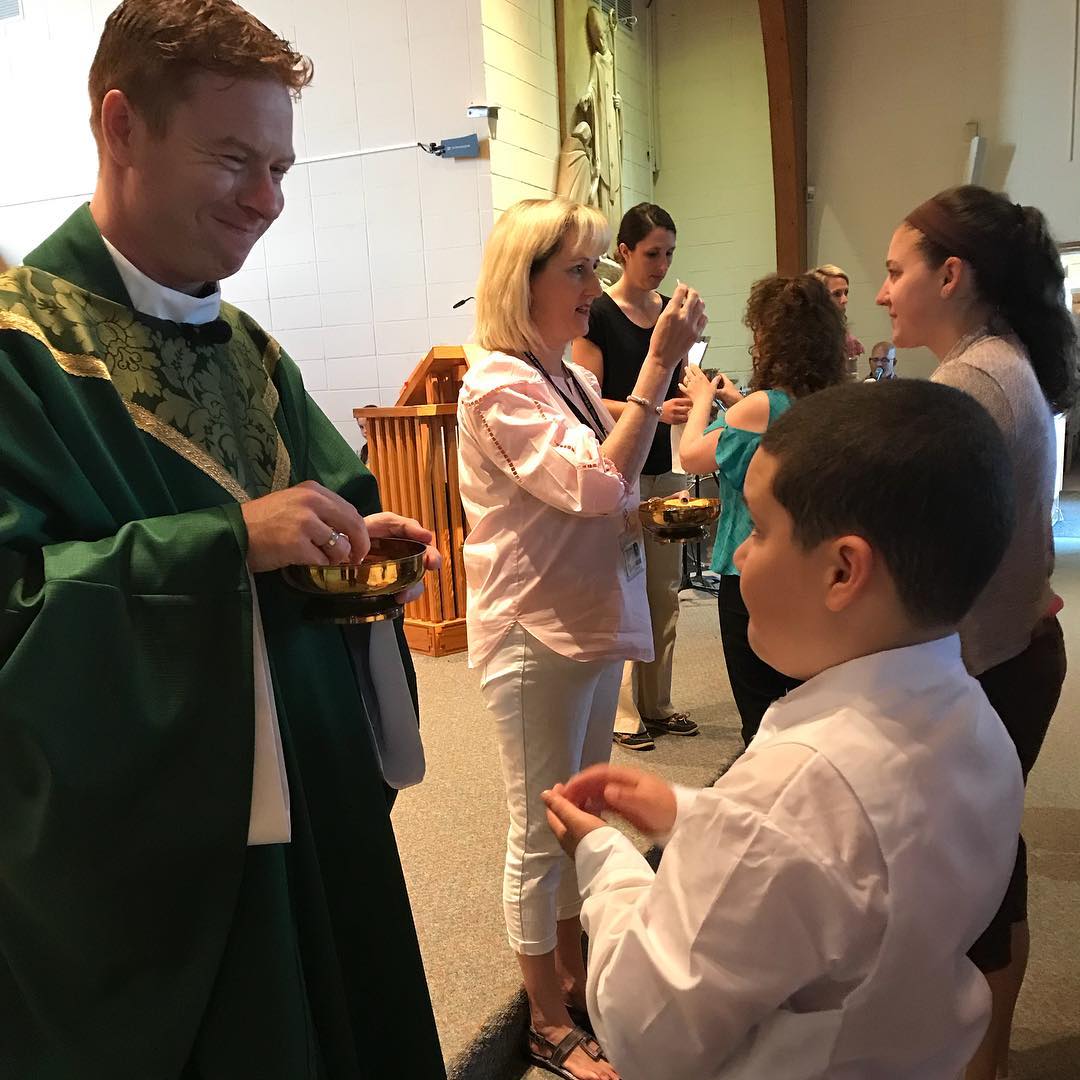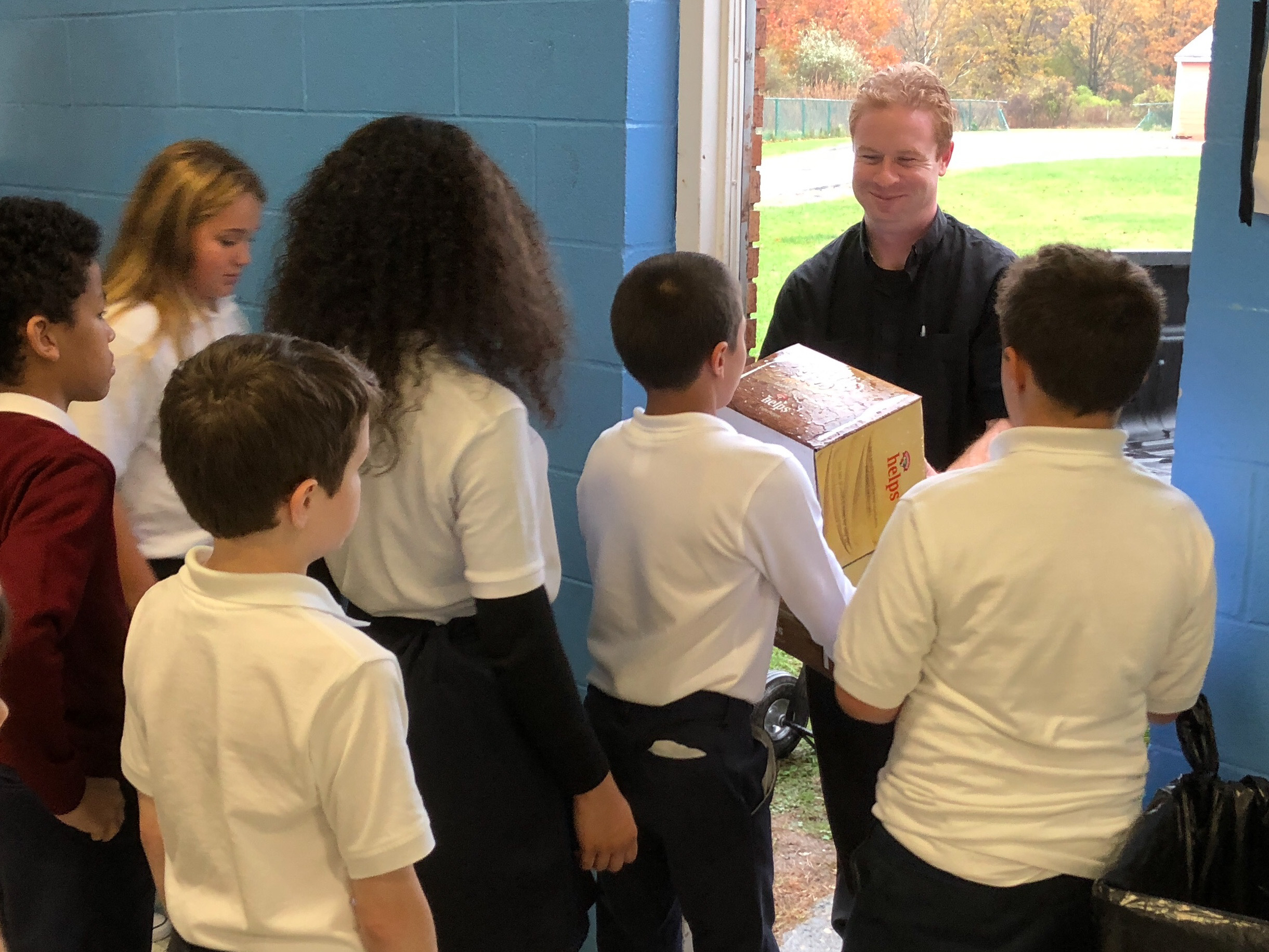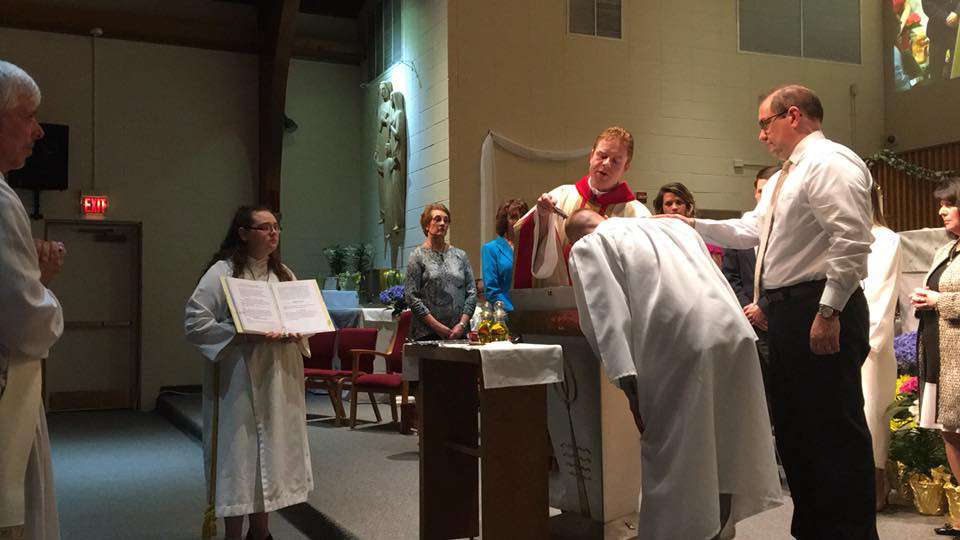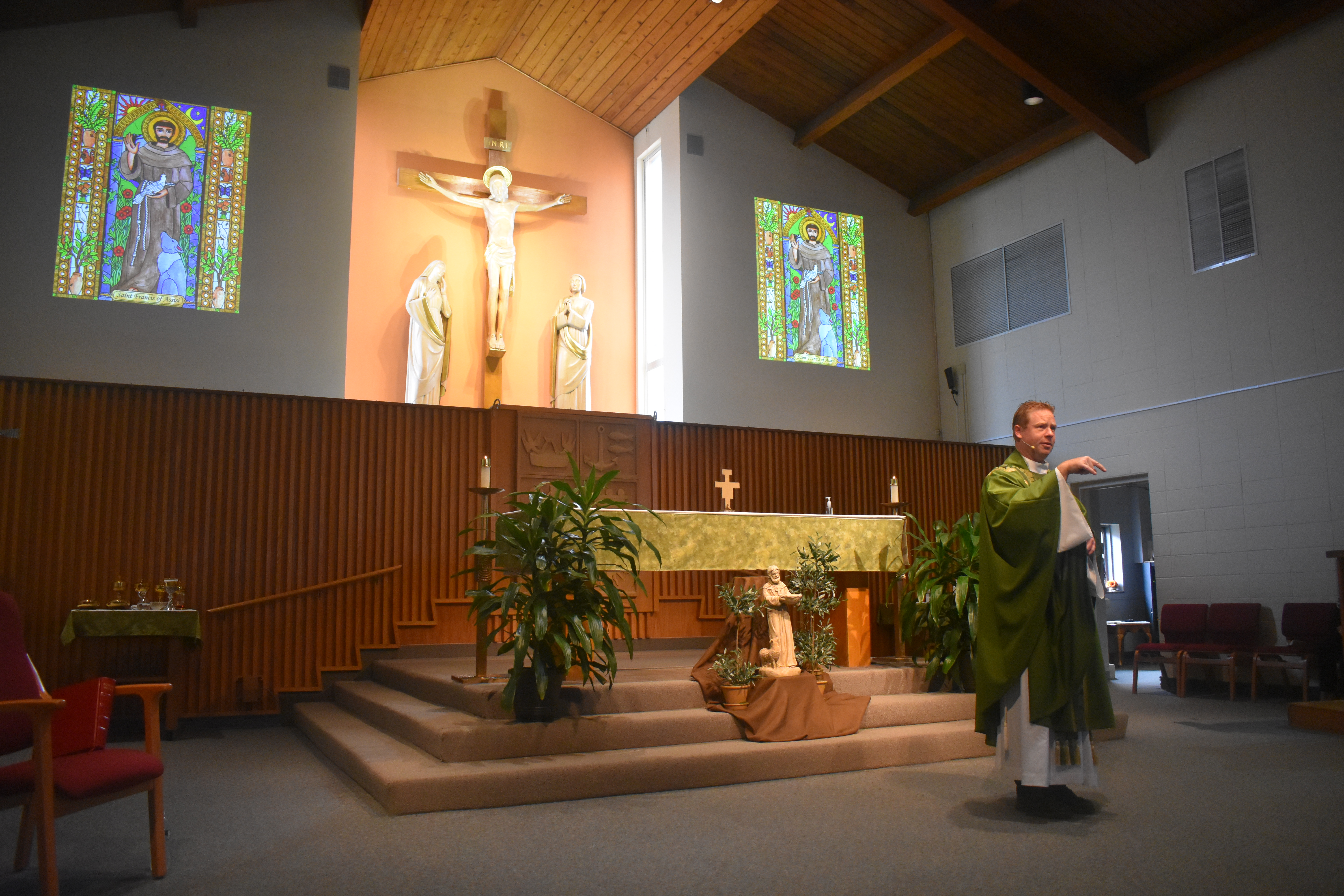February 14, 2024 at 9:34 a.m.
|
Updated May 30, 2025 at 11:36 a.m.
CATHOLIC VOICES
Father Brian Kelly, who is the pastor of St. Ambrose Church in Latham and co-pastor of Holy Trinity and St. Michael’s, both in Cohoes, recently was named as Vicar for Vocations by Bishop Edward B. Scharfenberger. Father Kelly, who succeeds Father Thomas Hoar, SSE, who had served as Director of Vocations and Clergy Formation since Aug. 1, 2022, talked with Mike Matvey of The Evangelist about his vocation journey and his new job in this latest edition of Catholic Voices.
TE: Are you from the area?
FK: I am from Latham. I grew up right around Siena College. Originally (my family were parishioners) at OLA (Our Lady of the Assumption) in Latham and then I worked for Holy Trinity in Cohoes since I was 14. My parents, Tom and Kathy, my brother and sister-in-law, Sean and Krista, all have roots in the Capital Region. Father (Arthur) Becker was my godfather and he was in seminary with my father, who was actually ordained a transitional deacon before he met my mother. I did grounds and maintenance work, worked fulltime, and went to Siena and got my accounting degree and eventually I became business manager for Holy Trinity, a number of parishes in Cohoes and cemetery administrator for St. Joseph’s in Waterford.
TE: How did you discern your calling to the priesthood?
FK: My story isn’t the straight line to the priesthood. I worked for the church and I wanted nothing to do with going to church. I worked for Holy Trinity for about 10 years and I started having this thought and feeling in my heart that I couldn’t shake. There was a secretary there, Joanne, who would say, “You should be a priest someday.” It was kind of a joke for us more than anything. But I started to really get this feeling, this sense that kept coming up, and I am like I don’t even go to church, what are you talking about God? It was not an overnight decision to finally speak up and ask for guidance. I continued to work full time while I tried to figure out that on my own. Eventually I said, “I’m not getting anywhere with answers on my own, so if I’m going to figure this call out, I need help to know what’s really going on.”

TE: Who helped you with your discernment process?
FK: I grew up with a lot of the priests in the area. Like I said, my father was in seminary so he knew a lot of them. We were pretty close as a family with Father George Fleming, Father John Tallman and many of the others that were the giants in the immediate area. Growing up and having a close relationship with them I got to see firsthand a priest becoming “part of a family,” what priests actually do and what their life was really like. For me, you could say my life was unintentionally perpetually shadowing priests.
When I first started talking about this call to those priests in particular, their initial response was, “No. 1, you don’t even go to church” but what quickly followed was, “I could easily see you as a priest.” It was interesting that their response was incredibly supportive and positive. With the parish secretary, Joanne, and the faith formation coordinator, Karen Beattie, at Holy Trinity, it was more of a joke with us. My response was never one looking for affirmation, it was always quick to dismiss. I would go so far as to say, “After your son signs up then I’ll sign up.” I believe he was married at the time so it was my sarcastic response to close that vocation door.
No matter how much “church” I had intertwined in my life, I didn’t have a lifelong “you should do this” echoing around me. The call for me, the sensation in my heart that I couldn’t shake, was incredibly private and personal when it first began. However, once it was out I couldn’t help but see the support around me in the parish, with Father (James) Walsh, our vocation director, and especially amongst my family and friends. That moment changed my life for the better and set me on this path in which I’ve never looked back.

TE: So it sounds like it just took time for your priestly vocation to come out?
FK: Absolutely. When the Bishop first asked me to do this, I said, “You know my story, right?” I was the trouble-causing teenager at school, the kid who was angry with God and the one who didn’t see the beauty and value of our faith. However, I think that it is something incredibly relatable, especially today, because it is so common to find young folks with a similar story. Teenagers and young college-age adults, when you are talking about faith, can quickly attest that having faith is countercultural, more private and can even be found with resistance in our everyday environment.
TE: In your new job as Vicar for Vocations, has your role been defined?
FK: The Bishop has charged me with leading and developing a new team that consists of Deacon Paul LeBlanc, Father Dan Quinn and Father Stephen Yusko. The various backgrounds and passions of each of us is something that has already become very apparent and will only help our Diocese in the end. In addition to this, the Bishop created a new board made up of professionals, clergy and religious that are going to be involved in redeveloping our vocations promotion, formation programs for all clergy and act as a support for the Vicar for Clergy’s office overseeing ongoing formation. Our entire goal is to intertwine each area of formation as well as where we can be of support for clergy wellness long term.
TE: Is the family still most important when it comes to vocations?
FK: Family can be the most important support for someone in formation, however it isn’t always the case, nor required. The more people in your corner the better, especially when it comes to those closest to you. In my family, my grandfather was in seminary before he met my grandmother, my father was in seminary before he was ordained a transitional deacon when he met my mother, left and got married. My uncle, my father’s brother, was a priest, Father Richard Kelly, who was my first godfather and my second godfather was Father Arthur Becker. So again, priests were part of our faith and faith was instilled in us much more than on the weekends. My brother, Sean, and I learned this firsthand, but faith was never forced upon us. The joke in our family is “God collects” because my grandfather and father both found their calling in married life. But here I am like the prodigal son coming home finally only to be greeted in the parable’s same way.
If you are really talking about ways to encourage vocations, in all things and faith, the church technically starts at home, with the family. People may see something in their son or daughter in following a vocation but they have their own hesitation with it. I think that is part of what we need to address. Some people, they want grandchildren, or they want their kid to be a certain professional: a doctor, baseball star, movie star or a lawyer. Concern on whether they will be happy or lonely in their religious life are always things that come up and stand in the way. Success, happiness and loneliness I would say are based upon the standard you are using to measure it. This life is countercultural, yet so fulfilling when it comes to happiness and success. We lead people closer to Jesus Christ … what could be more successful than that? As for being lonely, I don’t think this life allows you to really be lonely. I personally am a huge introvert, with the amount of people I am around every day, I struggle to actually have the chance to be lonely (Father Kelly said with a laugh).
TE: Do you know what these parish-based teams would look like?
FK: No. I got my key to the office last week (laughs) and I got my ID with it. I have been connecting with the seminarians. (Feb. 1 was) my first real day in the office. It is something that we are looking to develop into for the beginning of summer as a significant push for vocations. With that, the Bishop’s vision is to create teams within each vicariate that are taking on implementing programs centered around praying for vocations. Our hope is to create a vocation awareness program that is ongoing and train folks in each vicariate to not only encourage, but support and walk with someone during their vocational journey. The model would be centered on “accompaniment” as someone hears and chooses to follow the call.
Our hope in the end is to focus on what would be realistic, supportive and beneficial for pastors to implement in their parishes. The last thing we want is to come up with a program that a pastor is unable or unwilling to support.

TE: Vocations are thriving in places like Africa and Asia. How do we get that back in the Diocese and the States?
FK: We are facing a cultural problem in the church in the USA that I think we need to mend. Trying to reorganize and address the failings of the church over the years all at once is necessary, however, it certainly hinders us in many ways. With openness, willingness and a new vigor we can certainly emerge better than ever before so that the comparison with other areas in the world that are thriving is a thing of the past. Within this we can certainly see the monumental task at hand that is centered around a culture shift not just in the Diocese, but more importantly within each parish. For vocation encouragement we want to focus on the value of the vocation starting at home. Not just within the family, but within the parish they call home (and) the vocation director becoming much more of a partner to the pastor and family in this journey of discerning the Lord’s call.
We really want to make it so every parish is perpetually seeking vocations within it. I think that the value in my story is I was the kid who didn’t even go. We have only looked for somebody who is the altar boy, the one who is there all the time, the one dedicated and involved in youth ministry, as the only potential options. When you are in parishes and those potential candidates are dwindling too, no wonder our eyes are closed and we are hesitant to see the call in others.
I think that the excitement that they have in other countries that are flourishing in vocations, is because the vocations culture is embedded in their societal culture. The excitement about their faith to begin with along with excitement within the family of their child becoming a priest, deacon or religious sister is something they have a leg up on us for sure. We need to learn from, emulate and chase after with the same excitement they have for Christ as being one of His followers. We need for each of us to dig deep within ourselves and remember the initial fire within our hearts that brought us to Christ in the first place. Other cultures can show us how to fuel that so that we too can go out and light the world.
TE: So evangelization plays into that as well?
FK: Evangelization is the mission all of us are tasked with equally. However, the term itself is one that folks immediately check out on when they hear it. Commonly it is misunderstood as proselytizing or the work of the clergy and religious alone. Evangelization at its core is to spread the faith we hold in Christ with Baptism, forgiveness and the Resurrection at the center. I have always told people if you are really going to spread the faith, that is to evangelize, the best way you can do it is share how it has helped you and your own personal relationship with Christ. Start there and don’t stop until every personal witness, struggle and benefit you have in your heart has been shared. Just don’t do it all at once (laughs). When you get deeply personal with someone this way though, especially when you are dealing with loss or troubled times, if you can tell them how Christ, the church and its ministers personally have helped you, that I think is the better way to spread the faith than “come to church, we have the sacraments, you don’t.” Again, this all comes down to a cultural shift which requires each and every one of us to nurture the future calls in our families and amongst our friends. It could be as simple as, “I can see this in you, has the Lord been trying to call you?”
- Shrine prepares to share Mother Seton’s ‘Revolutionary’ impact as America turns 250
- Russell Shaw remembered as ‘giant of the Church’ for contribution to Catholic communications
- Pro-life groups push back after Trump tells House GOP to be ‘flexible’ on Hyde Amendment
- Torrential rains, looming deadline, don’t deter last-minute pilgrims
- Wyoming Supreme Court strikes down abortion laws, including abortion pill ban
- Caribbean bishops had repeated plea for peace ahead of US attack on Venezuela
- SEEK 2026 summons youth to draw close to Christ, discover his plan for their lives
- As jubilee year ends, the faithful heed Pope Leo’s call to keep the church alive
- Pope Leo’s first Extraordinary Consistory: What to expect?
- Christians must resist allure of power, serve humanity, pope says at end of Holy Year









Comments:
You must login to comment.